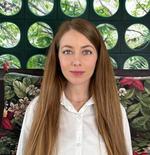Ilaria Sola
Dottorando/a

Contatti
Presso
- Cultural heritage and historical-artistic, audiovisual and multimedia production
- Dottorato in Patrimonio Culturale e produzione storico-artistica, audiovisiva e multimediale
Temi di ricerca
Ilaria Sola graduated with honours in Visual Arts (Master’s Degree) and Cultural Heritage Studies (Bachelor’s Degree) from the University of Bologna. Her master’s thesis investigated the complexity of the biennalization phenomenon through an analytical study of the Venice Art Biennale over the past 30 years. Her academic focus has consistently revolved around late 20th-century art, from the Neo-Avant-Gardes to the present day, with a particular emphasis on the intersections of art, collecting, and museology, as well as the political movements shaping contemporary discourse.
Following graduation, she completed two master’s programs in the management of artistic and cultural resources at IULM (Milan) and LUISS Business School (Rome), earning full-tuition scholarships in both. Concurrently, she began her professional career in the contemporary art sector, working across London, Rome, and Turin with galleries, art fairs, and cultural consultancy firms. She further enriched her professional profile with several years of experience in the non-profit sector, notably at the Fondazione Alda Fendi in Rome and the Fondazione Sandretto Re Rebaudengo in Turin. In 2024, she joined the team of the Curator of the 19th International Architecture Exhibition at the Venice Biennale, contributing to the development of the Public Program and overseeing the coordination of the archival process.
In 2024, Ilaria earned a diploma from the Scuola di Specializzazione in Historical-Artistic Heritage at the University of Macerata and was awarded a doctoral scholarship in the XL PhD cycle in Cultural Heritage and Historical-Artistic, Audiovisual, and Multimedia Production at the University of Turin. Her research focuses on Ida Gianelli’s tenure as director of the Castello di Rivoli Museo d’Arte Contemporanea (1990–2008) and the significance of historical feminisms in the representation of women artists’ works in museum collections, particularly from the 1990s onward.
The role of historical feminisms in the representation of women artists in italian museum collections: Ida Gianelli and the Castello di Rivoli
The research project critically analyses the influence of historical feminisms on the representation of women artists within Italian museum collections, centering on Ida Gianelli's directorship at the Castello di Rivoli Museum of Contemporary Art from 1990 to 2008. Utilising an interdisciplinary framework that intertwines gender studies, art history, and museum studies, this investigation scrutinises the evolution of Rivoli’s collections and curatorial practices throughout the 1990s. The study contextualises the interplay between Italian and broader European museum collections during this period, considering the influence of museum directors, the impact of contemporary socio-political movements, and the degree to which these institutions engaged with the poetics of women artists, whether feminist or not. It also interrogates the influence of radical feminist collectives, particularly examining Gianelli's connections, including her association with Carla Lonzi and her participation in the Rivolta Femminile group. The project seeks to delineate the foundational elements propelling Gianelli's curatorial methods and acquisition strategies, emphasising her commitment to enrich the museum's collection with works by women artists through notable solo exhibitions and targeted acquisition policies.
The Castello di Rivoli emerges as a critical case study for understanding the integration of women artists into the Italian museum landscape during the 1990s, serving as a precursor to subsequent gender equity initiatives within contemporary art institutions. An analysis of the exhibitions and acquisitions orchestrated under Gianelli’s leadership elucidates how feminist ideologies were articulated within curatorial frameworks, promoting not only progressive values but also a substantive representation of women artists within institutional collections.
This project aims to contribute to a nuanced understanding of the mechanisms underpinning cultural and political shifts in the museum sector, framing the Italian experience within a comparative analysis of similar developments across Europe and beyond. Addressing a gap in contemporary museological discourse, it intends to provide innovative methodologies for examining the intersections of artistic practice, historical feminisms, and cultural policy.
Additionally, the research aims to construct a systemic phenomenology that traces the evolving representation of women artists’ works in public museum collections, beginning in Italy and extending to a broader European context. This investigation will analyse the dynamics of museum collections in the 1990s through a political and gendered lens, yielding insights into wider trends and dynamics.
The project's structure revolves around four principal themes:
Collections: Investigating the critical and chronological factors that facilitated the inclusion of works by women artists in museum collections.
Museums: Examining the international significance of the Castello di Rivoli and comparing it to other European institutions.
Gender: Contributing to the discourse on the role of feminisms within contemporary museology.
Phenomenology: Systematically exploring the progressive inclusion of women artists in public museum collections, initially within Italy and subsequently across Europe.
Attività in agenda




